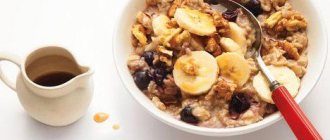Sometimes we all feel that we have lost clarity of thinking, that our thoughts are confused, that we cannot purposefully focus on the things that are important to us. The reasons for this state of affairs can be very different. Most often, of course, this is a habit of being distracted and delaying the completion of important tasks (read our article “Procrastination. Reasons and 10 ways to deal with it”), but it is possible that the body began to lack some elements and vitamins.
In ordinary life, we perceive food only as a source of strength and a way to get pleasure. But the substances contained in foods affect all body functions every day, including the activity of our brain. And it is not at all surprising that a deficiency of certain substances can cause increased distractibility and a deterioration in the ability to concentrate. Today we will talk about products that will help you improve brain function and normalize attention function.
You can learn about the peculiarities of the body’s functioning and how to maintain and increase your health by enrolling in our “Human Health” course.
Coffee
Despite the fact that drinking a lot of coffee and often not very beneficial for the body, most people start their day with this drink. Well, that's a good thing because it contains antioxidants and caffeine, which are good for the brain. They improve attention by blocking the production of adenosine, which causes drowsiness.
Studies have shown that people who drink coffee perform better at tasks that involve increased concentration than those who don't drink coffee. In addition, coffee stimulates the production of serotonin, which improves mood, and also reduces the risk of Alzheimer's and Parkinson's diseases.
Green tea
Green tea affects the body and brain no worse than coffee. But in addition to caffeine and antioxidants, it also contains the amino acid L-theanine, which reduces anxiety by stimulating the neurotransmitter GABA and increasing the frequency of alpha waves, promoting relaxation and reducing feelings of fatigue.
But note that if coffee helps you cheer up, then green tea, on the contrary, helps you relax and fall asleep faster. In addition to this, this drink has a wonderful effect on memory. It also cleanses blood vessels and normalizes the functioning of the gastrointestinal tract.
First signs of dementia
- Both long-term and short-term memory are impaired. It becomes difficult for a person to remember events that happened recently or remember new information.
- A person loses the skills of orientation in space and time. It is not uncommon for patients to become lost even in areas familiar to them.
- Indifference to once-loved activities appears, and the desire to learn new things disappears. This happens because the brain is no longer able to receive and process information.
- Reducing the criticality of one's own perception. Usually this symptom appears when planning the next period of life.
- In the future, both the progression of these symptoms and the appearance of others, more powerful in their effects, are noted. One of the clear hallmarks of dementia is that a person lives in his past.
At the earliest manifestations of the disease, it is important to promptly consult a therapist or general practitioner. If necessary, he will refer the patient to a specialist (neurologist, psychiatrist or geriatrician).
Dark chocolate
Dark chocolate, like cocoa, includes a whole range of beneficial substances for the brain - these are antioxidants, caffeine and flavonoids - a special type of plant antioxidants. They have a beneficial effect on the areas of the brain responsible for memory and learning. They also slow down the aging process of brain cells.
And, of course, we can’t help but remind you that dark chocolate is also a great way to improve your mood. During breaks from work, eat a few pieces of chocolate. You can even combine this with the use of techniques to combat distractions - you will benefit the body and have fun at the same time.
Fatty fish
Fatty fish is one of the most beneficial foods for the brain in general and for attention and concentration in particular. Sardines, trout, salmon and other fatty fish are rich in omega-3 fatty acids. These acids improve the ability to perceive and assimilate information and memory.
These same acids are used by the body in the production of nerve cells. They slow down the mental decline associated with age-related changes and prevent the development of Alzheimer's disease. A lack of these acids can lead to decreased brain performance and depressive states.
What does the brain need?
Proper nutrition is not only a set of foods rich in vitamins and macroelements. The basis of the diet is moderation and balance. We must avoid extremes: hunger and overeating. For normal blood supply, the body needs light and healthy food; fish, vegetables, lean meat, fruits, cereals, nuts. Next, we will tell you which substances will help improve brain function in adults and children.
Constant tension, stress, irregular nutrition, lack of sleep, poor environment - all these factors negatively affect brain cells. A complex of vitamins will help fill in the gaps and improve memory:
- B1 (thiamine) is the most important vitamin for those who work with a large amount of information. Element B1 helps the brain quickly switch from one topic to another and perform diverse tasks;
- B2 (or riboflavin) will help the body cope with emotional burnout and increased anxiety. B2 stabilizes the nervous system and improves memory. B3 (or niacin) promotes energy production, stimulates the restoration of nerve cells, and improves memory processes. Vitamin B3 is indispensable for athletes and people involved in physical labor;
- B5 (pantothenic acid) stimulates brain function, improves long-term memory, neutralizes depression;
- B12 (cyanocobalamin) supports the nervous system and improves concentration.
Vitamin complexes to improve memory can be found in any pharmacy. But taking medications will only be effective with proper nutrition. What products should be on your table? We'll talk about this in the next section.
Eggs
Eggs are a source of a huge amount of brain-healthy substances, including choline, folic acid, vitamins B6 and B12. Choline is a micronutrient involved in the synthesis of acetylcholine, which regulates memory and mood. By the way, it is one of the substances that enters the body less often.
As for B vitamins, they also play an important role in brain health. They prevent unfavorable age-related changes and prevent the development of dementia (acquired dementia), depression and anxiety, which are often a serious cause of distractibility and decreased concentration.
The role of prebiotics
Enriching food with prebiotics (substances that have no nutritional value for humans, but can improve the functioning of one’s own intestinal microorganisms) can lead to an increase in the formation of special substances (short-chain fatty acids) that are absorbed in the intestines and enter the brain. These substances can stimulate the synthesis of a certain protein that plays a key role in learning and memory. In addition, they help increase the formation of substances (serotonin and GABA), which improve perception and emotional background. There was even a special term for prebiotics in connection with their established effects in the brain - psychobiotics.
Turmeric
Turmeric contains the substance curcumin, which stimulates blood circulation and improves memory, prevents the development of Alzheimer's disease and cleanses the body of amyloid plaques that form on blood vessels.
Turmeric also promotes the production of dopamine and serotonin - sources of good mood that prevent the development of depression. Therefore, it can be used as an antidepressant.
Plus, turmeric stimulates the growth of brain cells, thereby enhancing the neurotrophic factor. In fact, this is a real prevention of age-related dementia, deterioration of attention and loss of concentration.
Top 20 most useful products
There are quite a lot of products that provide adequate nutrition and improve blood circulation and brain function in general. Keeping all of them in mind, you can easily create a very varied menu for all ages and for all occasions.
Sea fish and seafood
Fish and seafood are an essential component of a diet aimed at improving the functioning of the brain and the entire nervous system. Phosphorus, iodine, minerals, Omega-3 fatty acids help the brain maintain efficiency and youth . They affect:
- reducing the level of “bad” cholesterol;
- cleansing the walls of blood vessels from fatty plaques;
- active saturation of brain cells with oxygen and nutrients.
People who eat seafood at least once a week are much less likely to complain of poor memory and fatigue . And the likelihood of developing Alzheimer's disease in this case is significantly reduced. For more information on the effect of omega-3 acids on the brain, see a separate article.
For a complete diet, it is enough to choose literally 2-3 types of fish, for example, salmon, tuna, salmon, trout or herring. When it comes to seafood, you should definitely eat seaweed; you can choose squid, mussels, oysters, etc.
Eggs
Lecithin, fatty acids, vitamin B12 are especially needed by the brain. With their lack, organ atrophy begins, which in principle is natural for age-related changes. But they can start much later and be less noticeable.
The most useful component is the yolk of the egg. Contrary to popular belief, it is more likely to be beneficial than harmful, despite the fact that it contains a large amount of cholesterol.
The yolk of an egg contains choline , which nourishes brain cells and neurons, without which they cannot form and exist.
If you eat eggs regularly, it is enough to eat 1-2 eggs a day. With this amount, there is no risk of cholesterol deposition on the walls of blood vessels.
Milk
Milk is necessary for the brain because it contains tryptophan, a substance that is a source for the synthesis of serotonin , the hormone of joy. Therefore, milk must be on the table of anyone who wants to maintain a good mood, optimism and vigor.
In addition, the antioxidant glutathione , which researchers recently discovered in milk, improves neuronal function and helps maintain sanity into old age. The only condition is that milk must be consumed regularly.
Cereals
Nutritionists advise eating a lot of whole grain cereals at any age.
This is important both for the brain of a growing person and for an adult: for both it is equally important to have a good memory. The fact is that oats, wheat, barley, whole rice and bran from them contain a lot of folic acid and thiamine, that is, vitamin B6 .
Thus, porridge and whole grain bread are useful not only as a means of improving metabolism, but also as an excellent stimulator of blood circulation and improvement of brain activity.
Nuts
Seeds and nuts are used both as an independent snack and as an additional ingredient in dishes. They contain everything that brain cells need:
- vitamins E, group B;
- folic acid;
- fatty acids Omega-3 and Omega-6, etc.;
- minerals, including magnesium and potassium.
Nuts such as almonds, walnuts, cashews, peanuts, hazelnuts, pecans, and all types of seeds nourish the brain, provide a lot of energy, improve memory, elevate mood, and even reduce signs of depression. They contain a sufficient amount of fat, so by consuming them, you can be sure of the sufficient supply of vegetable fats in the body.
Green and leafy vegetables, herbs
Some consider these plants to be nothing more than seasonings or food additives. However, they contain so many vitamins important for mental activity that even a single loading dose can help:
- remember or remember a large amount of valuable information;
- increase the productivity of mental activity;
- relieve fatigue.
Greens owe these results to a large amount of B vitamins and folic acid. The value of these substances is that they reduce the amount of homocysteine, which accumulates in the body with age, destroys the walls of blood vessels and leads to pathologies such as memory loss and even Alzheimer's disease.
Berries
The benefits of berries such as blueberries, lingonberries, cranberries, strawberries, raspberries, blackberries, etc. are beyond any doubt. Vitamins, sugars, fiber, antioxidants, flavonoids from berries help:
- under heavy mental stress;
- to improve coordination and memory;
- to preserve youth and increase cell performance.
Even if fresh and frozen berries appear on the table once a week, the quality of mental activity increases noticeably.
Dried fruits
The rich vitamin and mineral composition makes dried fruits an essential product for those who want their head to work quickly and well. Dried apricots, raisins, prunes, figs, dates and other dried fruits and berries:
- reduce the level of “bad” cholesterol in the blood;
- cleans the blood vessels of the brain from cholesterol plaques;
- improve memory and concentration;
- help maintain good coordination.
Dried fruits are not one of those healthy foods that you can eat the more the better. Like nuts, they are consumed in small quantities due to their high caloric content and strong concentration of other substances. A dozen berries or 2-3 tablespoons of a mixture of ground dried fruits is enough.
Honey
Honey is a recognized healer of the cardiovascular and nervous system. With constant mental work, it is definitely needed in the diet as a means of:
- cleanses the blood and blood vessels from “bad” cholesterol;
- helping the functioning of the bloodstream, which means improving cerebral circulation;
- giving a lot of energy.
For more information about the importance of honey for the brain, see a separate article.
Vegetable oils
Unrefined vegetable oils do not contain cholesterol at all, which means they do not contribute to the development of atherosclerosis. Moreover: they help dissolve and remove existing cholesterol deposits from the body.
Unrefined, directly pressed oils also contain vital omega-3, omega-6, as well as less important but beneficial omega-9 unsaturated fatty acids. Thanks to them, as well as the vitamin and mineral composition, oils that are beneficial for the brain:
- help maintain a healthy vascular system, preventing clogging of the arteries;
- strengthen the walls of brain vessels;
- help increase concentration, strengthen memory and reduce the time for the manifestation of neuropsychic reactions.
bitter chocolate
Many people are familiar with the effect that appears after eating a piece of chocolate. This sweetness is not only tasty, but also healthy because:
- improves mood due to the production of serotonin - the hormone of joy;
- improves cerebral circulation;
- thanks to flavonol, it helps preserve the youth of brain cells by fighting free radicals.
A large number of antioxidants are found not only in chocolate, but also simply in cocoa powder. But the most useful product containing cocoa beans is dark and bitter chocolate. There the content of cocoa beans is maximum and reaches 95%. Read more about the effects of chocolate on the brain here.
Coffee
Scientists are constantly arguing about the benefits of coffee for the brain and cardiovascular system.
There are many theories regarding the mechanisms of coffee's effect on blood vessels. One of them is that the coffee molecule is similar to the molecule of a substance that is found in every cell called adenosine.
Adenosine slows down energy production. And when coffee molecules replace adenosine , energy processes in brain cells reach a new level.
Tea
Besides coffee, there are a number of drinks that can help keep your brain functioning at a high level. These include tea. Both black and green teas contain catechins . These unique substances help:
- improve brain activity;
- remember information well;
- relax, restore strength faster.
It is better to drink tea in the morning and afternoon. In this case, you can drink it as much as you want, with benefit for mental activity and without damage to the heart, blood vessels and nerves.
Turmeric
This amazing seasoning comes from India. But it is actively used both in cooking and in folk medicine as a means of excellently helping to increase brain productivity. Turmeric for the brain is interesting because it can:
- relieve inflammation in brain tissue;
- restore neurons;
- destroy sodium benzoate, which interferes with connections between brain cells;
- act as an antioxidant that protects cells from aging;
- give a positive attitude due to the production of the hormones dopamine and serotonin.
Curry
Seasonings have a very good effect on blood circulation, increasing brain productivity and maintaining brain activity.
Besides the fact that it is a spicy seasoning that gives a pleasant taste to dishes, curry:
- supports thinking abilities due to curcumin content;
- helps fight free radicals, that is, prolongs the youth of the brain.
Moreover, you don’t need to think that you need to cover all your food with this seasoning: it’s enough to eat one dish a week to get all the benefits.
Ginger
A spice with a pungent taste and fresh aroma is very beneficial for the heart, blood vessels and brain cells. In folk medicine, ginger is used for treatment, prevention and stimulation of brain activity as a remedy:
- blood thinner;
- improves cerebral circulation;
- with regular use, it significantly improves memory;
- preventing the development of Alzheimer's and Parkinson's diseases.
Ginger can be used either fresh or in powder to improve brain function. Most often it is mixed with lemon and honey. Ginger essential oil is also useful: it is dissolved in milk, kefir or dripped onto honey and sugar.
Lemon
The value of lemon for the brain is associated primarily with its high content of vitamin C, potassium, magnesium and other minerals . Lemon helps:
- cleansing blood vessels from cholesterol growths;
- prevention of overwork and stress relief.
Lemon, consumed fresh, as part of vitamin mixtures and infusions, will have a good effect on mental activity. Lemon essential oil is also effective: it can be used for aromatherapy, and taken orally at the rate of 1-2 drops per glass of fruit juice, teaspoon of honey or per lump of sugar.
Garlic
Garlic, in the absence of contraindications, is required in the diet of every person. In addition to vitamins, valuable minerals, phytoncides, sugars and other important components, garlic contains a specific substance allicin , which is produced after crushing a garlic clove.
The brain needs garlic in its raw form: during heat treatment, only its taste properties remain, while many beneficial properties are destroyed. Fresh garlic:
- improves blood composition, thins it, promoting better blood circulation;
- reduces the production of so-called “bad” cholesterol in the liver, preventing it from depositing on the walls of brain vessels;
- rejuvenates cells by neutralizing free radicals.
Plain water
The brain cannot function normally without sufficient fluid in the body. Often, a feeling of chronic fatigue and drowsiness are signs of a lack of moisture in the body.
The best way to replenish fluid reserves and thereby protect the brain from dehydration is to drink regular drinking water: it is best absorbed without carrying additional calories, such as fruit juice. In addition, it is not a diuretic like coffee or tea.
A more or less suitable alternative to water may be herbal infusions. But even in cases with them there may be contraindications. Therefore, drinking water is the best source of fluid for brain cells.
An adult needs to drink about 2 liters of water per day. This volume can easily be distributed in 2 glasses for the early morning, the time between breakfast and lunch, lunch and afternoon snack, afternoon snack and dinner. If you have problems with the heart, excretory system, etc., you can slightly shift your water intake schedule to the daytime so that you drink all the water before 16 hours.
Dry red wine
Natural red wine has long been known as a means of stimulating brain function and protecting it from premature aging.
The only condition: it can be consumed no more than 50-150 ml per day, depending on gender, age, body size and concomitant diseases. Otherwise, instead of activating and maintaining mental activity, this can lead to progressive dementia.
Red wine contains a good range of microelements and antioxidants , which:
- prevent the development of atherosclerosis by widening the arteries and clearing them of cholesterol plaques;
- protect brain vessels from destruction, strengthening them;
- prevent age-related dementia and prolong youth.
Broccoli
Broccoli also contains a lot of useful substances, including unique antioxidants. It is especially important that literally 100 grams of this product contains over 100% of the daily requirement of fat-soluble vitamin K, necessary for the formation of sphingolipids (these are fats found in brain cells).
Broccoli has an excellent effect on memory, has an antioxidant and anti-inflammatory effect, and enhances the body's ability to fight brain damage. It is recommended to include broccoli in your daily diet and consume it during periods of increased stress and fatigue.
Glucose: friend or foe for the brain?
Why is it that during a diet your head is slow to think, and your mood is below the baseboard? The reason is a lack of glucose. In the body, this monosaccharide is instantly converted into energy, and about 50% is taken by the brain. Hence the strong desire to eat a piece of chocolate or a bun before starting the working day.
Important! When consuming foods with a large amount of “simple” carbohydrates (sweets, baked goods), the glucose level first increases and then drops sharply. As a result, a person becomes tired, irritable, and mental abilities decrease.
Nutrition will have a good effect on mood and mental activity if glucose is absorbed gradually.
Therefore, you need to eat foods rich in “complex” carbohydrates and fiber:
- products made from whole grain flour;
- cereals (especially pearl barley, buckwheat, oats, brown rice);
- legumes: soybeans, beans, lentils;
- dried fruits.
The brain should receive glucose replenishment in the first half of the day. Otherwise, the body will not have time to consume energy from carbohydrates, which will have a bad effect on the figure. In addition, glucose can cause insomnia, as it tones the psyche.
Greens and leafy vegetables
Green onions, parsley and dill are an inexhaustible source of antioxidants and carotenoids that improve brain function. Our ancestors knew about their beneficial properties. This is probably one of the reasons why greens have always been the most important ingredient in a huge number of dishes.
No less useful are arugula, corn, lettuce and spinach, so popular in the West. In general, they need to be included in the diet even more often, because they contain B vitamins and folic acid, which have a positive effect on attention, memory and general brain health. It’s worth remembering: the darker the color of the green, the better.
Features of the diet for a child
For the normal development of a child’s body, products from the list are required, which are necessary for the development and stimulation of full-fledged brain function. Except for some nuances.
- The diet of a child or teenager should contain more protein foods: white lean meat. fish, seafood.
- To compile a children's menu, spicy and hot seasonings are used somewhat less, focusing on the age and taste preferences of the child.
- Red wine is excluded, since ethanol in its composition is contraindicated for children.
Flax seeds
You can often hear nutritionists and nutritionists calling flax Russian fast food. And this is not at all easy, because it contains a record amount of omega-3 fatty acids, as well as fiber, magnesium and B vitamins. This set of substances very quickly saturates the brain and incredibly improves concentration.
Keep in mind that flax seeds are covered with a dense shell, which is why they may not be absorbed very well. It is best to consume them in ground form: either a teaspoon in pure form, or as an addition to soup, yogurt, salad or smoothie. Truly a wonderful thing, and very tasty too.
Scientific information
Thanks to the accumulated scientific data on the effect of nutrition on the ability to think and cognition, an independent branch of modern medicine has emerged - neuropsychonutritiology. This is a scientifically based approach that explains the role of nutrients and other biologically active food additives in the development of intelligence, as well as psychological activity in the form of the ability to remember, artistic and musical perception. The need for a balanced and nutritious diet is important at any age, but it is of fundamental importance during critical periods of a person’s life - at the stage of intrauterine development, in the first two years of life and in adolescence. Let's look at the role of nutrition in a child's development and what is the optimal food for the brain.
Pumpkin seeds
Pumpkin seeds contain very strong antioxidants that prevent free radicals from damaging the body and brain. These seeds also serve as a source of copper, zinc, iron and magnesium - all of which are required for active brain activity.
Copper is involved in the control of nerve impulses and prevents the development of Alzheimer's disease. Zinc prevents the development of many neurological diseases, as well as Parkinson's disease and depressive conditions.
Iron maintains mental clarity and allows the brain to perform its functions normally. And magnesium is necessary for concentration and learning; It also prevents depression from developing and prevents headaches and migraines.
Squirrels
Protein is the third most important nutrient for brain health. Proteins are complex molecules that do some of the work in our cells and are also needed for the structure, activity and regulation of brain networks. Proteins are made up of smaller particles, amino acids, attached to each other in long or short chains. The number and sequence of amino acids that form proteins determine the specific shape and properties of proteins. Amino acids are essential in every process that occurs in the body and brain: from maintaining healthy tissues, creating hormones, to triggering various chemical reactions. Amino acids are involved in the transmission of information, they are part of the substances that trigger impulses that force us to wake up every morning, concentrate, and so on. To keep all these cognitive functions from faltering, the brain must receive a daily portion of protein. Your brain will be helped to work smoothly:
- chia seeds
- cheese
- shrimps
- chickpeas, red beans
- whole milk
- prunes
- natural yogurt
Nuts
Eating nuts is an excellent prevention of heart disease and an activator of effective brain function. They contribute to a significant improvement in cognitive abilities and prevent the development of neurodegenerative diseases. Regular consumption of nuts improves memory.
Nuts are a source of vitamin E, antioxidants and various healthy fats, including omega-3. It’s not just that walnuts look like the brain, because with every nut eaten, brain function improves. Other healthy nuts include hazelnuts, peanuts, pine nuts, and almonds.
Avocado
As you know, the efficiency of the brain and the performance of its functions largely depend on good blood supply. Avocado, which contains fatty acids, promotes proper blood circulation, and also increases the elasticity of blood vessels and reduces cholesterol levels in the blood.
In addition to this, avocados contain dietary fiber. They are responsible for regulating blood sugar levels and controlling hunger. It is very useful to eat avocado as an independent fruit or add it to various dishes on your regular menu, such as salads.
What should you avoid?
If a diet is being prepared for the full functioning of the brain, then foods harmful to mental activity must be excluded or their consumption reduced to a safe minimum.
- Alcohol. To dilate the blood vessels of the brain, it is permissible, but only periodically. Only red wine can be called uniquely healthy, and then in very limited quantities. Regular consumption of other drinks leads to the destruction of brain cells. For more information about the effects of alcohol on the brain, see a separate article, specifically about beer here.
- Fatty food. Fatty meats, smoked meats, fried foods, and fatty dairy products contribute to the development of vascular atherosclerosis, as they cause an excess of “bad” cholesterol, which is deposited on the walls of blood vessels and interferes with the blood supply to brain tissue.
- Refined sugar. Energy is needed for mental activity. But it is better to use fructose for this purpose, which is found in honey and fruits. In turn, regular sugar has a destructive effect on brain cells.
- Energy drinks and artificial stimulants. Unlike natural energy products, artificial ones provide only a visible effect of vigor. In fact, they deplete the nervous system, as they use the body’s internal reserves, artificially stimulating them. After drinking energy drinks, loss of strength and depression occur.
Blueberry
Blueberries are beneficial both for the body in general and for the brain in particular. It contains a high content of anthocyanins - plant substances with antioxidant and anti-inflammatory effects. They prevent the development of neurodegenerative diseases and slow down the aging process of the brain.
Thanks to the antioxidants contained in blueberries, this berry helps improve connections between brain cells, improves concentration and memory. Today, by the way, blueberries are actively used in medicine, because they have proven themselves to be an effective remedy in the fight against short-term memory loss.
Harmful products
Having included healthy foods in the menu, you need to limit the consumption of junk food. Unfortunately, without changing your eating habits you will not get the desired effect. As we wrote above, brain cells need good blood supply. Therefore, it is worth excluding from the diet foods that contribute to the development of atherosclerosis:
- fatty meat, lard, smoked meats;
- cream, fats, margarines;
- fast food;
- baked goods, sweets;
- alcohol.
All of the above does not provide the body with useful substances, on the contrary: fried potatoes, smoked lard, milk fat, sugar and alcohol destroy it, contribute to the aging of blood vessels and the formation of atherosclerotic plaques. All this leads to early aging of the brain, decreased concentration, and the development of dementia.
Oranges
Oranges are the richest source of vitamin C, and one such fruit contains your daily requirement. Naturally, oranges are very good for the brain, because vitamin C, as studies have shown, prevents the aging process from developing and prevents the occurrence of diseases associated with it.
Plus, eating these orange fruits prevents free radicals from affecting the brain. And along with oranges, vitamin C is found in large quantities in strawberries, tomatoes, kiwi (it’s generally called the vitamin bomb), guava and bell peppers.
But the list of goodies that improve brain function and the ability to concentrate is not exhausted by the listed products. In addition to them, we strongly recommend that you take note of some herbs.
Herbs to Improve Brain Function and Concentration
The herbs that we will talk about often serve as ingredients for preparing a wide variety of healing infusions, teas, balms and mixtures. If you see them in the composition of the drugs you buy, it means that you are looking at something really worthwhile. However, you can use them yourself:
- Ginkgo biloba. This plant has long earned its reputation as a natural energy source. It performs a tonic function, helps sharpen attention, improves concentration on intellectual tasks and allows you to perform physical work with greater accuracy.
- Rosemary. Despite its great popularity as an aromatic spice, this plant strengthens the blood vessels of the brain and also helps it work smoothly. When consumed, the neuropsychic state is normalized and cortisol levels are reduced. You can use rosemary to combat absent-mindedness and to prevent attention deficit disorder.
- Ginseng. The root of this plant, thanks to its unique concentration of rare minerals and vitamins, is known throughout the world as one of the strongest stimulants of brain activity. It significantly improves attention, reaction speed and memory, and for this it is enough to drink ginseng tea just once a day!
- Eleutherococcus. Another world-famous herb that enhances many body functions, such as resistance to stress and immunity. But it is no less useful as an effective neuropsychic remedy. Eleutherococcus extract balances, improves memory and gives amazing concentration. But, of course, for this it needs to be consumed regularly.
- Horsetail This herb contains many vitamins and minerals, rare metal salts and silicon dioxide. Due to their content, horsetail improves blood circulation in the brain and makes blood vessels more elastic, sharpens attention and memory. Experts recommend diluting one teaspoon of horsetail infusion with a glass of boiling water, and it is advisable to drink such a drink daily at least once a day.
If you start including the foods we’ve talked about in your menu, and consume these herbs in the morning or throughout the day, you will be surprised at how good and cheerful you can feel literally every day. At the same time, your body will become much stronger, and your brain will be able to work much more efficiently and for a longer time.
Carbohydrates for the central nervous system
If proteins are the building material for neurons and the substrate for the synthesis of neurotransmitters, then carbohydrates are the energy base. One of the final monosaccharides that is formed during the breakdown of complex carbohydrates is glucose. It is necessary for the brain to obtain energy. For this reason, carbohydrates must be present in the diet, but in reasonable quantities.
However, professor-neurologist from the USA David Perlmutter does not agree with this official opinion of nutritionists and dietitians. He believes that the human body does not need carbohydrates at all. And there is a good explanation for this: metabolism is designed in such a way that, in conditions of a shortage of available carbohydrates, the body can independently synthesize them from existing reserves of fats and proteins. This chemical process is called gluconeogenesis.
David Perlmutter suggests limiting the consumption of carbohydrate foods as much as possible, because he believes that they “kill” the brain. Whether to agree with this opinion or not is a personal matter for everyone, because it has not yet been scientifically proven. Official medicine believes that it is necessary to take carbohydrates with food.
Healthy carbohydrates recognized by nutritionists today include sugars contained in:
- vegetables (asparagus, tomatoes, sweet peppers, zucchini);
- greens (green salad, onions, parsley, dill);
- moderately sweet or unsweetened fruits (apples, lemons, avocados);
- berries (strawberries, raspberries, blackberries, blueberries, cranberries).
Vegetables, fruits and berries are also useful for their high content of non-starchy polysaccharides, the so-called ballast compounds (fiber, pectin), which normalize intestinal motility, adsorb harmful and toxic substances in its lumen, and restore intestinal microflora. The dark-colored berries are rich in antioxidants, which protect lipids in cell walls from peroxidation and free radical damage.
Additional Tips
However, following recommendations on what to eat and drink is only one part of the issue. The other is that you need to take care of yourself and try not to do (or do as little as possible) things that harm the body and lead to deterioration of brain function. Let's give some advice on this topic.
Healthy and proper nutrition is always about helping yourself. But the maximum benefit from the brain and its capabilities can only be obtained by eliminating or reducing the consumption of harmful foods. First of all, this is, of course, alcohol. Despite the benefits of alcohol that many people talk about, it is a serious enemy for attention and memory. Ethanol destroys brain cells, and if your activity involves concentration, you should reduce your alcohol consumption to a minimum.
Fatty meat is also not the best choice. It contains cholesterol, the excess of which is simply not absorbed by the body. As a result, it remains on the walls of blood vessels, which begins to impede blood circulation in the brain and depress cognitive functions. And all kinds of snacks, processed foods and fast food contain many harmful food additives, trans fats and salt. This also has a very adverse effect on the blood vessels of the brain.
And you should not overuse baked goods, cheeses, ready-made curds and sweets containing refined sugar. All that is good in all this is one taste. Otherwise, such products lead to a deterioration in the supply of useful substances to the brain and an additional problem - obesity. Dried fruits, honey, dark chocolate, and fruit and nut mixtures will help replace sweets.
And in conclusion, let us remind you that no diet or gastronomic habits should affect your water consumption. Like all other functions of our brain, attention, concentration and active mental activity depend on how much water you drink daily. If you drink enough of it, the intensity of your thought processes will become higher, and you will be able to concentrate much faster and longer.
If the body experiences a lack of life-giving moisture, one should not be surprised at low efficiency and productivity, difficulties in concentrating, confusion of thoughts and other similar things. All these are possible consequences of the fact that you simply drink very little. The norm for an adult is 2.5-3 liters of water per day. So make it a habit to drink a glass of water every few hours.
And in addition to this article, we recommend
General principles of nutrition
The brain is one of the most complex organs of the human body. Without it, neither mental work nor normal physiology is possible.
For its operation you need:
- various amino acids;
- polyunsaturated fats Omega 3 and Omega 6;
- vitamins, especially vitamins E and C;
- water and many other substances and compounds.
Therefore, the principles of nutrition for maintaining brain health come down to a few simple rules.
- Introduction to the diet of certain foods containing all the beneficial substances necessary for the thinking organ. This is lean white meat, fatty sea fish and seafood (except caviar), vegetables and fruits, cereals, nuts, natural unrefined oils, not too fatty dairy products, herbs and seasonings. You can also follow a special MIND diet to improve cognitive function.
- Eliminating food that is harmful to the brain , which clogs blood vessels, reduces blood circulation and reduces its performance. This includes semi-finished products, fast food, sausages, smoked meats, fatty meats and dairy products, sweets with refined sugar, baked goods, lemonades, alcohol, strong black tea and coffee in large quantities, and salt.
- Drinking enough liquid. Brain tissue is 80% water, so a lack of fluid in the body has a detrimental effect on metabolic processes and the speed of transmission of nerve impulses. Due to lack of fluid in the body, it is the brain that dies first. We discussed in detail the importance of water for the brain in a separate article.











